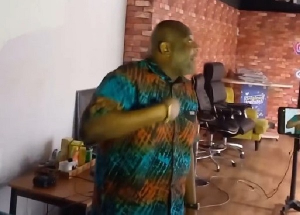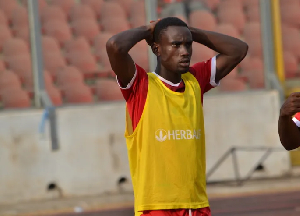The ace music producer Jeff Tennyson Quaye Jnr also known as JQ was born on December 24th 1977 in Osu.
He attended Wesley Gramma Secondary School for his O’ Level before pursuing his A’ Level course at the X’tra Mural Academy an affiliated body of Accra Academy School during the weekend granted your number one entertainment news paper Weekly Fylla an exclusive interview at his Hush Hush studios.
He touches on a lot of issues from his days as a prolific icon to a near anarchy at the Hush Hush studios, as he spoke to DJ Amess.
Weekly Fylla(WF): How did it begin?
Jeff Quaye. (JQ): It all started in 1993 when I was in my forth year at Wesley Grammar Secondary School, my interest when I realized my love for music was inevitable so I decided to take part time lesson in music at the Oriental School of Music and I major in keyboard playing, subsequently l started playing for my church.
WF: So how did you get involve in music production?
JQ: Hmm! In Ghana we don’t have any specialized institution that train sound engineers but in my case I was recruited by my church member Freddie Kyie Mensah who then owns Fredima Studios and took me through the rudiment of sound engineering in 1996.
WF: As a producer how will you access the music industry and Hip life…?
JQ: The industry has a great future if only stake holders will put in place a proper mechanism and policy to regulate it, so that piracy becomes less attractive and enticing big record companies like EMI or Sonny to invest in the industry it will be better for all. On Hip life when it started way back in the 90s, it was not easy. People just come to you with already made rhythms of hip hops in mind and they ask you to produce the same thing for them to rap over it.
That was the genesis of its criticisms until I told my self that in order for hip life to take its rightful place in Ghanaian music and outside world it must have identity. So I started experimenting with some of our local and Africa rhythm like kpalongo, jama, gome, adowa and soukus. My style came under fire by connoisseurs of the industry, but since I knew what I was doing I kept the fire burning with Buk Bak’s “Klu Brofo”, “Aye Fe Notse” (remix), Castro’s “Sradinam” among others became a real hit. Then when VIP “Ahomka Wom” broke all odds to win Ghana Music Awards and Kora Awards many joined the fray to produce the same rhythm they were criticizing. Today if you listen to most songs in the market they have an element of jama in them.
WF: Is high life really dying as many people want us to believe? What should be done?
JQ: Music is dynamic and it serves as a common ground for both young and old to enjoy but all over the world there have been changes to whatever we were listening to yester years and this is what most people don’t seems to understand. In fact hip life has gone through a lot of revolution then it started. The youth now add more singing and choruses to their songs with a limited bar of raps.
This is the fusing of High life and Hip life for the both old and the new order. Just recently Obour and AB Crenstil came out with the “Best of the Life’s” by remixing the old tracks of A.B and in fact it is doing very well. So also is good old Daddy Lumba doing it with Okyeame Quame and it has caught up well with both the youth and the elderly.
WF: Let talk about the Technology. What kind of software do you use and how does it affect you or the industry?
JQ: The computer technology has come to modify whatever we were using during the olden days. I cannot disclose the type I use but you see music react to technology on the models we use. As a producer I got to have a market appeal in order to add good rhythm that can stand a test of time. I started with Rotator through Qubase before I finally settled with Pro Tools, so it depends on what one uses and believe.
WF: Why did you leave Hush Hush?
JQ: It is a long story and a painful experience I don’t want to talk about. I came to work one day only to realized that the computer has crushed destroying all the projects I have with renowned artist like Ofori Aponsah, Kofi Nti, Nkasie, VIP, and a host of others
WF: Did it affect you?
JQ: Of course. Not only me but the artistes too. It made me lose contact with most of my clients and even friends but I have leant my lesson.
WF: So you are back and what should your fans expect?
JQ: New image, new vision and new ideas. So far I have had a good work over there and still working on other projects like that of Daddy Lumba, Kwabena Kwabena, Praye, Deba, Nana Acheampong among others. I hope to take my rightful place soon.
WF: I Can you share your good and bad moments with your fans…
JQ: Let me begin with good moments. The day I saw VIP playing my product “Ahum Ka Wom” at the Kora Awards with people waving their handkerchiefs my heart gladdened and it inspired me a lot. Also when I experimented with the instrumentation of Castro’s Toffee song by applying soukus and jama it has become one of the best hip life instrumental of all time and it continue to enjoy more air play than ever. As for the bad moment I think the Hush Hush incident stand tall and I don’t want to go into it.
WF: How do you interact with your clients?
JQ: We get on well. Some of them come to the studios without any idea of what they are coming to do. What I normally do is to teach and direct them of what they should do because at the end of the day it is my reputation at stake.
Some come for assistance but it is not easy. Now day’s producers don’t collect “Demo any longer. They all want master and if you cannot record master, even that”
WF: Do you play any live instruments too?
JQ: Yes I sometime play live instruments if the artist so wish but it depends on what instrument they want at what cost. Formerly the executive producers sit by their artist and pay for everything but these days hardly for a producer to come to the studio with their artist but if you add the instrumental analog also go a long way to enrich the songs and their output.
WF: Why are we not in the international market?
JQ: We need good policy and record labels to handle the industry. Record labels like EMI, Sony, and Universal Records should be brought to help marketing our stuff. What we have in Ghana is individual labels that cannot do it a lone. I leant the Present of MUSIGA Alhaji Sidiku Buari is the vice president of International Federation of Musicians and I think he should use his position to lobby for some of these company to invest in the industry.
WF: Have you trained somebody to replace you in the near future?
JQ: (Laughter), yeah! My own brother and a few others. When I was at with Freddie anytime he was not around I take over the class and teach them including others who are now making it big, I don’t want to mention names, it is all part of the training amidst laughter.
WF: Why is that there are no women in this industry?
JQ: I have met only one lady a daughter of one Mr. Faakye also a producer. She is very good and I am currently working with sister Rita Marley’s lady called Pear, so is not as if there are no women but it is men oriented.
WF: Any advice for the musicians?
JQ: Yeah.. Is like most of our artistes today don’t want to take their education seriously. A lot of them have stopped school to do music but they are wrong. That is why some of them have contractual and expression problem. How can you say Opera Winfrey interview you and you say I want to speak Twi or EMI give you contract you don’t know what it entails so I will plead with them to be patient and go to school.
“Look those names we were hearing those days where are they now? What they shouldn’t for get is fame does not exist forever” he cautioned.
WF: Any awards and does it come with prize rewards?
JQ: Yes and no. I have won a few awards in Ghana and UK. No because non come with any prize awards, the plaques are just for recognition.
WF: Are you married?
JQ: No am single but hope to go to the altar next year, trusts me especially when I finished with my building project.
WF: Thank you for talking to me
JQ: My pleasure.
















